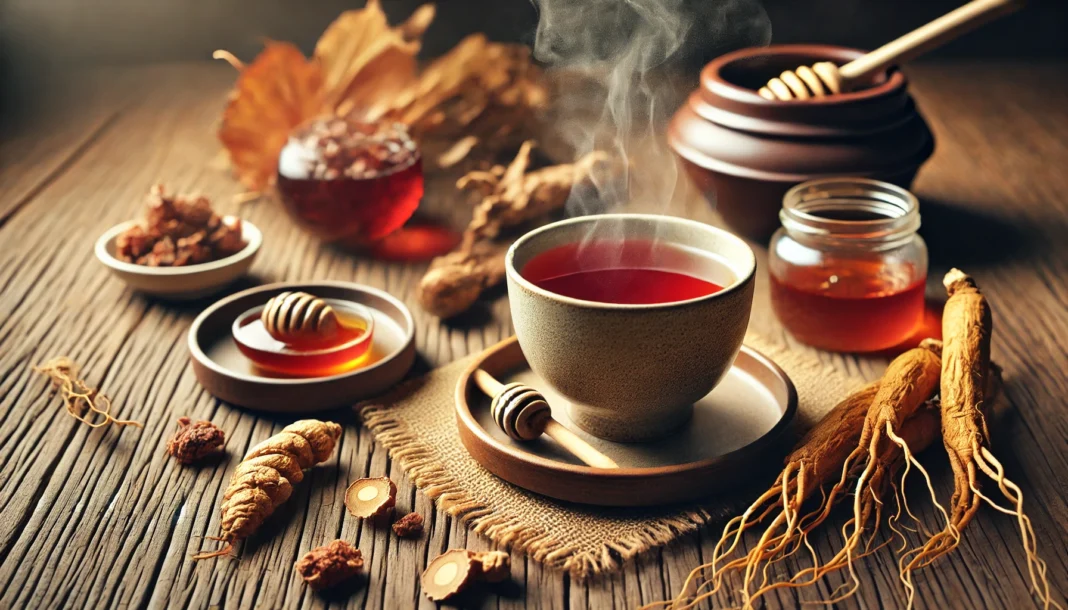Korean red ginseng tea has been revered for centuries in traditional medicine for its profound health benefits. Derived from the roots of Panax ginseng, this adaptogenic herb is processed through a unique steaming and drying method that enhances its bioactive compounds, making it more potent than its unprocessed counterpart. Modern science has begun to validate what ancient practitioners have long understood—Korean red ginseng tea possesses remarkable properties that can support physical energy, strengthen immune function, and contribute to overall well-being. This article explores the extensive health benefits of this herbal remedy, shedding light on its physiological impact, key active compounds, and practical applications for optimal health.
You may also like: Rhodiola vs. Ashwagandha: Which Adaptogen Best Supports Gut Health and a Fiber-Rich Diet?
Understanding Korean Red Ginseng: Origins and Processing
Korean red ginseng, distinct from white ginseng, undergoes an elaborate preparation process that enhances its efficacy. After harvesting, the ginseng root is steamed at high temperatures before being dried, a process that alters its chemical composition and increases the concentration of ginsenosides, the active compounds responsible for many of its health benefits. This preparation method also extends the root’s shelf life, making it more stable for medicinal use. The unique properties of Korean red ginseng tea stem from these specialized processing techniques, which contribute to its superior potency compared to other forms of ginseng.
Historical records suggest that ginseng has been used for over 2,000 years in East Asia, particularly in Korea, China, and Japan, where it was traditionally prescribed to combat fatigue, promote longevity, and enhance cognitive function. Today, scientific research continues to explore the mechanisms by which Korean red ginseng tea exerts its therapeutic effects, affirming its role as a valuable supplement in modern wellness practices.

Boosting Energy and Reducing Fatigue
One of the most well-documented benefits of Korean red ginseng tea is its ability to enhance physical and mental energy. Unlike stimulants such as caffeine, which can cause jitteriness and energy crashes, Korean red ginseng tea works by modulating the body’s stress response and supporting sustained vitality. The ginsenosides in ginseng influence the hypothalamic-pituitary-adrenal (HPA) axis, helping to regulate cortisol levels and improve resilience against stress-induced fatigue.
Several studies have demonstrated that individuals who consume Korean red ginseng tea experience significant improvements in stamina and endurance. A clinical trial published in The Journal of Translational Medicine found that participants who supplemented with Korean red ginseng exhibited reduced levels of oxidative stress and inflammation, key contributors to chronic fatigue. Additionally, ginseng’s role in enhancing mitochondrial function contributes to improved energy metabolism, making it a popular choice among athletes and individuals seeking natural ways to combat daily exhaustion.
Strengthening the Immune System
Korean red ginseng tea has long been recognized for its immunomodulatory properties, making it a powerful ally in supporting the body’s defense mechanisms. The polysaccharides and ginsenosides present in ginseng have been shown to enhance the activity of immune cells, including macrophages, natural killer cells, and T-cells, which play a crucial role in identifying and neutralizing pathogens.
Research published in The American Journal of Chinese Medicine highlighted the effects of Korean red ginseng on immune function, revealing that regular consumption of ginseng tea significantly increased the production of antibodies and cytokines essential for immune defense. Furthermore, a study conducted by the Korean Society of Ginseng reported that ginseng supplementation reduced the incidence and severity of colds and respiratory infections, particularly in individuals with weakened immune systems.
Given its ability to modulate inflammation and enhance immune surveillance, Korean red ginseng tea is increasingly recommended as a preventive strategy against seasonal illnesses and chronic infections. Its adaptogenic properties also help regulate immune function, preventing overactivation that could lead to autoimmune responses.
Enhancing Cognitive Function and Mental Clarity
Cognitive health is another area where Korean red ginseng tea has shown remarkable promise. The bioactive compounds in ginseng support neuroprotection by reducing oxidative stress and inflammation in the brain, thereby improving memory, focus, and overall mental clarity. Ginsenosides have been found to enhance acetylcholine release, a neurotransmitter critical for learning and memory.
A randomized controlled trial published in Psychopharmacology demonstrated that individuals who consumed Korean red ginseng tea exhibited enhanced cognitive performance, particularly in tasks requiring attention and information processing. Additionally, research from The Journal of Ginseng Research has suggested that ginseng’s neuroprotective effects may reduce the risk of age-related cognitive decline and neurodegenerative disorders such as Alzheimer’s disease.
By improving cerebral blood flow and reducing neuroinflammation, Korean red ginseng tea offers a natural approach to maintaining cognitive health and supporting long-term brain function. This makes it an appealing supplement for students, professionals, and older adults looking to enhance their mental acuity.
Supporting Cardiovascular Health
The benefits of Korean red ginseng tea extend to heart health, where its vasodilatory properties contribute to improved circulation and cardiovascular function. Ginsenosides help regulate blood pressure by promoting nitric oxide production, which relaxes blood vessels and enhances oxygen delivery to tissues.
A meta-analysis published in The Cochrane Database of Systematic Reviews found that individuals who consumed Korean red ginseng tea experienced modest but significant reductions in blood pressure and cholesterol levels. Furthermore, research indicates that ginseng may reduce the risk of atherosclerosis by inhibiting the oxidation of low-density lipoprotein (LDL) cholesterol, a key factor in the development of cardiovascular disease.
Given these findings, incorporating Korean red ginseng tea into a heart-healthy diet may support cardiovascular wellness, reduce hypertension risk, and enhance overall circulatory efficiency.

Frequently Asked Questions (FAQ) About Korean Red Ginseng Tea
1. How does Korean red ginseng tea differ from other types of ginseng tea?
Korean red ginseng tea stands apart from other ginseng varieties due to its unique preparation process and higher concentration of beneficial compounds. Unlike American or white ginseng, which is typically air-dried, Korean red ginseng is steamed and then dried, a method that enhances its ginsenoside content. These ginsenosides, the active compounds responsible for many of the tea’s health benefits, are present in significantly higher amounts in Korean red ginseng tea than in other types of ginseng. Additionally, the steaming process alters the root’s chemical composition, making it more bioavailable and enhancing its adaptogenic effects. This means that Korean red ginseng tea offers a more potent and longer-lasting impact on energy, immunity, and cognitive function compared to other ginseng varieties.
2. Can Korean ginseng tea help with stress management?
Yes, Korean ginseng tea is well-known for its adaptogenic properties, which help the body adapt to stress more effectively. The bioactive compounds in Korean red ginseng tea modulate cortisol levels, reducing the physiological impact of chronic stress. Many individuals report a sense of improved mental clarity and reduced anxiety after incorporating the tea into their routine. Unlike stimulants that provide temporary relief but can lead to energy crashes, Korean red ginseng tea promotes sustained resilience by regulating the body’s stress response. Regular consumption can enhance overall emotional well-being and support mental balance, making it a beneficial natural remedy for those dealing with high-stress environments.
3. How does Korean red ginseng tea support immune function?
Korean red ginseng tea has been widely studied for its immunomodulatory effects. It enhances the function of key immune cells such as macrophages and T-cells, helping the body defend against infections more effectively. The polysaccharides and ginsenosides found in the tea stimulate the production of cytokines, which play a crucial role in immune system communication and response. Regular consumption of Korean red ginseng tea has been associated with a lower incidence of colds, flu, and other infections. This makes it a valuable addition to a wellness regimen, particularly during flu season or in individuals with weakened immune systems.
4. Can drinking Korean ginseng tea improve cognitive function?
Yes, Korean ginseng tea has demonstrated significant cognitive benefits, particularly in enhancing memory, focus, and overall mental clarity. The ginsenosides present in Korean red ginseng tea improve blood flow to the brain, promoting better oxygenation and nutrient delivery to neural cells. Studies suggest that regular consumption can enhance information processing speed and support long-term brain health. Some research even indicates that Korean red ginseng tea may help delay cognitive decline associated with aging. Its neuroprotective properties make it a valuable beverage for students, professionals, and older adults looking to maintain mental sharpness.
5. How does Korean red ginseng tea impact physical energy and stamina?
Korean red ginseng tea is widely recognized for its ability to enhance physical endurance and reduce fatigue. Unlike caffeine, which stimulates the nervous system and can cause energy crashes, Korean ginseng tea works by supporting mitochondrial function and optimizing energy metabolism at a cellular level. This makes it particularly beneficial for athletes and individuals with demanding lifestyles who require sustained energy levels. Research suggests that it improves endurance by reducing oxidative stress and enhancing the body’s ability to utilize oxygen efficiently. Regular consumption may also aid in faster recovery after physical exertion.
6. Is Korean ginseng tea suitable for individuals with high blood pressure?
Korean red ginseng tea has been studied for its cardiovascular effects, with some research suggesting it may help regulate blood pressure. The nitric oxide-promoting properties of ginsenosides can improve blood vessel function and support better circulation. However, individual responses vary, and in some cases, ginseng may cause a mild increase in blood pressure. Those with hypertension should consult their healthcare provider before incorporating Korean ginseng tea into their routine. Monitoring blood pressure changes after consuming the tea can help determine its suitability for individual health conditions.
7. Can Korean red ginseng tea help with weight management?
Emerging research suggests that Korean red ginseng tea may play a role in weight management by supporting metabolism and reducing inflammation. The bioactive compounds in Korean ginseng tea have been found to improve insulin sensitivity and promote fat oxidation, both of which are critical for maintaining a healthy weight. Additionally, its adaptogenic properties help balance stress hormones, which can contribute to weight gain when elevated for prolonged periods. While it should not be viewed as a standalone solution for weight loss, drinking Korean red ginseng tea alongside a balanced diet and regular exercise may enhance metabolic efficiency. Some studies also suggest that ginseng’s impact on gut microbiota may contribute to improved digestion and weight regulation.
8. Does Korean ginseng tea have any potential side effects?
Although Korean ginseng tea is generally well-tolerated, some individuals may experience mild side effects, particularly when consumed in large quantities. Possible side effects include digestive discomfort, mild headaches, or difficulty sleeping, especially if taken too close to bedtime. Korean red ginseng tea may also interact with certain medications, such as blood thinners, diabetes medications, and immune suppressants. It is recommended to start with a lower dose and observe any reactions before increasing consumption. Consulting a healthcare provider before taking Korean ginseng tea is especially important for individuals with pre-existing medical conditions or those on prescription medications.
9. What is the best way to prepare and consume Korean red ginseng tea?
The preparation of Korean red ginseng tea can significantly influence its flavor and potency. The traditional method involves steeping a few slices of dried ginseng root or a pre-packaged tea bag in hot water for about 10–15 minutes. Some prefer to simmer ginseng slices for a longer period to extract a more concentrated brew. Adding natural sweeteners such as honey or a dash of lemon can enhance the taste without compromising the tea’s health benefits. For optimal effects, it is generally recommended to consume Korean ginseng tea in the morning or early afternoon, as it provides a natural energy boost that lasts throughout the day.
10. How long does it take to experience the benefits of Korean ginseng tea?
The effects of Korean ginseng tea can vary depending on the individual’s metabolism, frequency of consumption, and overall health status. Some people notice increased energy and mental clarity within hours of drinking the tea, while others may require several weeks of consistent consumption to experience its full benefits. For long-term advantages, such as improved immune function or cognitive support, regular intake over a period of several months may be necessary. It is important to approach Korean red ginseng tea as part of a holistic wellness regimen rather than expecting immediate, dramatic results. Gradual and sustained use is often the key to unlocking its full therapeutic potential.

Conclusion: Harnessing the Power of Korean Red Ginseng Tea
Korean red ginseng tea is a time-honored herbal remedy backed by modern scientific research, offering a wealth of health benefits ranging from enhanced energy and immune support to cognitive and cardiovascular protection. Its adaptogenic nature allows the body to better cope with stress, making it a valuable supplement for individuals seeking holistic wellness solutions. By integrating this powerful tea into daily routines, individuals can experience sustained vitality, improved mental clarity, and fortified immune defenses. As ongoing research continues to uncover additional therapeutic applications, Korean red ginseng tea remains a cornerstone of natural health and longevity.
Further Reading:
7 Possible Health Benefits of Ginseng
What are the health benefits of ginseng?
herbal tea benefits, adaptogenic herbs, natural energy boosters, immune system support, cognitive health supplements, stress relief tea, traditional Asian medicine, ginseng root extract, herbal remedies for fatigue, plant-based wellness, antioxidant-rich teas, holistic health drinks, metabolism-boosting herbs, brain-boosting beverages, heart health supplements, natural ways to reduce stress, endurance-enhancing teas, functional herbal infusions, wellness-boosting botanicals, longevity-promoting herbs
The information contained in this article is provided for general informational purposes only and is not intended to serve as medical, legal, or professional advice. While NewsHealthWatch strives to present accurate, up-to-date, and reliable content, no warranty or guarantee, expressed or implied, is made regarding the completeness, accuracy, or adequacy of the information provided. Readers are strongly advised to seek the guidance of a qualified healthcare provider or other relevant professionals before acting on any information contained in this article. NewsHealthWatch, its authors, editors, and contributors expressly disclaim any liability for any damages, losses, or consequences arising directly or indirectly from the use, interpretation, or reliance on any information presented herein. The views and opinions expressed in this article are those of the author(s) and do not necessarily reflect the official policies or positions of NewsHealthWatch.

